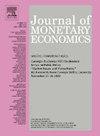主权风险和荷兰病
IF 4.3
2区 经济学
Q1 BUSINESS, FINANCE
引用次数: 0
摘要
我研究了在存在违约风险的情况下,荷兰病如何放大资本部门分配的低效率。在一个包含商品以及贸易和非贸易商品生产的主权违约模型中,当更多资本被分配到非贸易生产中时,违约诱因就会增加。家庭不会将其内化,从而导致非贸易部门规模过大,效率低下。商品暴利通过典型的荷兰病机制放大了这种低效率。我描述了实施有效分配的国家有条件补贴的特征,并将其与改善外部性的更简单补贴规则进行比较。来自利差、自然资源租金和部门投资数据的证据支持模型的主要结论。本文章由计算机程序翻译,如有差异,请以英文原文为准。
Sovereign risk and Dutch disease
I study how, in the presence of default risk, the Dutch disease amplifies an inefficiency in the sectoral allocation of capital. In a sovereign default model with commodities and production of traded and non-traded goods, default incentives increase when more capital is allocated to non-traded production. Households do not internalize this, giving rise to an inefficiently large non-traded sector. Commodity windfalls amplify this inefficiency through the classic Dutch disease mechanism. I characterize state-contingent subsidies that implement the efficient allocation and compare them to a simpler subsidy rule that ameliorates the externality. Evidence from spreads, natural-resource rents, and sectoral investment data support the main findings of the model.
求助全文
通过发布文献求助,成功后即可免费获取论文全文。
去求助
来源期刊

Journal of Monetary Economics
Multiple-
CiteScore
7.20
自引率
4.90%
发文量
90
审稿时长
74 days
期刊介绍:
The profession has witnessed over the past twenty years a remarkable expansion of research activities bearing on problems in the broader field of monetary economics. The strong interest in monetary analysis has been increasingly matched in recent years by the growing attention to the working and structure of financial institutions. The role of various institutional arrangements, the consequences of specific changes in banking structure and the welfare aspects of structural policies have attracted an increasing interest in the profession. There has also been a growing attention to the operation of credit markets and to various aspects in the behavior of rates of return on assets. The Journal of Monetary Economics provides a specialized forum for the publication of this research.
 求助内容:
求助内容: 应助结果提醒方式:
应助结果提醒方式:


